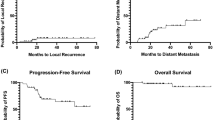Abstract
Since total mesorectal excision for rectal cancer was first described in 1988, widespread adoption of this technique has improved oncologic outcomes significantly. However, improved survival and decreased local recurrence rates in patients having anterior resection have not translated into equivalent improvements in those having abdominoperineal excision and permanent stoma. The most significant factor in determining appropriate first-line treatment is accurate and reproducible prediction of a negative circumferential resection margin. MRI is quickly emerging as the gold standard for the preoperative staging of rectal cancer. It may be the key to assessing whether safe restorative resection is feasible or an abdominoperineal excision may be oncologically superior when performed in a more radical or cylindrical (extralevator) plane. This article explores the latest evidence for optimizing surgery in rectal cancer.
Similar content being viewed by others
References and Recommended Reading
Dehni N, McFadden N, McNamara DA, et al.: Oncological results following abdominoperineal resection for adenocarcinoma of the low rectum. Dis Colon Rectum 2003, 46:867–874.
Wibe A, Syse A, Andersen E, et al.: Oncological outcomes after total mesorectal excision for cure for cancer of the lower rectum: anterior vs. abdominoperineal resection. Dis Colon Rectum 2004, 47:48–58.
Quirke P, Durdey P, Dixon MF, et al.: Local recurrence of rectal adenocarcinoma due to inadequate surgical resection. Histopathological study of lateral tumour spread and surgical excision. Lancet 1986, 2:996–999.
Dulk M, Marijnen CAM, Putter H, et al.: Risk factors for adverse outcome in patients with rectal cancer treated with an abdomino-perineal resection in the total mesorectal excision trial. Ann Surg 2007, 246:83–90.
Wibe A, Rendedal PR, Svensson E, et al.: Prognostic significance of the circumferential resection margin following total mesorectal excision for rectal cancer. Br J Surg 2002, 89:327–334.
Heald RJ, Husband EM, Ryall RD: The mesorectum in rectal cancer surgery—the clue to pelvic recurrence? Br J Surg 1982, 69:613–616.
Heald RJ: The ‘Holy Plane’ of rectal surgery. J R Soc Med 1988, 81:503–508.
Heald RJ, Moran BJ, Ryall RD, et al.: Rectal cancer: the Basingstoke experience of total mesorectal excision, 1978–1997. Arch Surg 1998, 133:894–899.
Association of Coloproctology of Great Britain and Ireland: Guidelines for the Management of Colorectal Cancer, edn 3. London: Association of Coloproctology of Great Britain and Ireland; 2007.
The Standards Practice Task Force; The American Society of Colon and Rectal Surgeons: Practice parameters for the management of rectal cancer (revised). Dis Colon Rectum 2005, 48:411–423.
Martling AL, Holm T, Rutqvist LE, et al.: Effect of a surgical training programme on outcome of rectal cancer in the County of Stockholm. Stockholm Colorectal Cancer Study Group. Lancet 2000, 356:93–96.
Kapiteijn E, Putter H, van de Velde CJ. Impact of the introduction and training of total mesorectal excision on recurrence and survival in rectal cancer in the Netherlands. Br J Surg 2002, 89:1142–1149.
Wibe A, Moller B, Norstein J, et al.: A national strategic change in treatment policy for rectal cancer: implementation of total mesorectal excision as routine treatment in Norway. A national audit. Dis Colon Rectum 2002, 45:857–866.
Quirke P, Steele R, Monson R, et al.: Effect of the plane of surgery achieved on local recurrence in patients with operable rectal cancer: a prospective study using data from the MRC CR07 and NCIC-CTG CO16 randomised clinical trial. Lancet 2009, 373:821–828.
Engel AF, Oomen JL, Eijsbouts QA, et al.: Nationwide decline in annual numbers of abdominoperineal resections: effect of successful national trial? Colorectal Dis 2003, 5:180–184.
Branagan G, Finnis D; Wessex Colorectal Cancer Audit Working Group: Prognosis after anastomotic leakage in colorectal surgery. Dis Colon Rectum 2005, 48:1021–1026.
Brown G, Radcliffe AG, Newcombe RG, et al.: Preoperative assessment of prognostic factors in rectal cancer using highresolution magnetic resonance imaging. Br J Surg 2003, 90:355–364.
MERCURY Study Group: Diagnostic accuracy of preoperative magnetic resonance imaging in predicting curative resection of rectal cancer: prospective observational study. BMJ 2006, 333:779.
Bartram C, Brown G: Endorectal ultrasound and magnetic resonance imaging in rectal cancer staging. Gastroenterol Clin North Am 2002, 31:827–839.
Sauer R, Becker H, Hohenberger W, et al.: Preoperative versus postoperative chemoradiotherapy for rectal cancer. N Eng J Med 2004, 351:1731–1740.
Pijl MEJ, Chaoui AS, Wahl RL, et al.: Radiology of colorectal cancer. Eur J Cancer 2002, 38:887–898.
Glancy DG, Pullyblank AM, Thomas MG: The role of colonoscopic endoanal ultrasound scanning (EUS) in selecting patients suitable for resection by transanal endoscopic microsurgery (TEM). Colorectal Dis 2005, 7:148–150.
Marr R, Birbeck KF, Garvican J, et al.: The modern abdominoperineal excision — the next challenge after total mesorectal excision: a clinical and morphometric study. Ann Surg 2005, 242:74–82.
Shihab O, Brown G, Daniels I, et al.: Patients with low rectal cancer treated by abdomino-perineal excision have worse tumours and higher involved margin rates compared with those treated by anterior resection. Dis Colon Rectum (in press).
Heald RJ, Smedh RK, Kald A, et al.: Abdominoperineal excision of the rectum—an endangered operation. Dis Colon Rectum 1997, 40:747–751.
Nagtegaal ID, van de Velde CJH, Marijnen CA, et al.: Low rectal cancer: a call for a change of approach in abdominoperineal resection. J Clin Oncol 2005, 23:9257–9264.
Salerno G, Daniels IR, Brown G: Magnetic resonance imaging of the low rectum: defining the radiological anatomy. Colorectal Dis 2006, 8:10–30.
Holm T, Ljung A, Haggmark T, et al.: Extended abdominoperineal resection with gluteus maximus flap reconstruction of the pelvic floor for rectal cancer. Br J Surg 2007, 94:232–238.
West NP, Finan PJ, Anderin C, et al.: Evidence of the oncological superiority of cylindrical abdominoperineal excision for low rectal cancer. J Clin Oncol 2008, 26:3517–3522.
Author information
Authors and Affiliations
Corresponding author
Rights and permissions
About this article
Cite this article
Bevan, K.E., Moran, B.J. Optimizing rectal cancer surgery by total mesorectal excision and “cylindrical” extralevator techniques for abdominoperineal excision. Curr colorectal cancer rep 5, 219–223 (2009). https://doi.org/10.1007/s11888-009-0030-9
Published:
Issue Date:
DOI: https://doi.org/10.1007/s11888-009-0030-9




